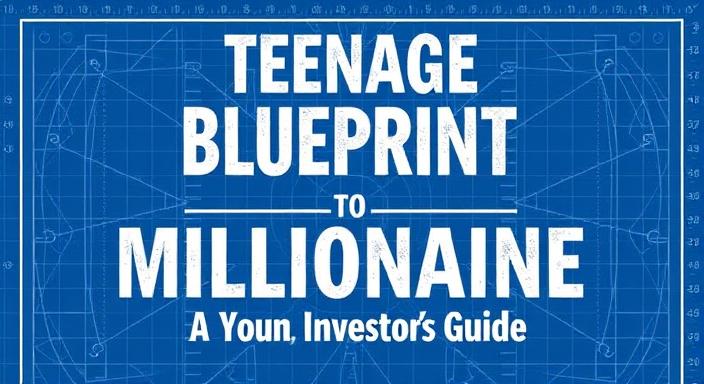Becoming a Teenage Millionaire | Teenage Blueprint
Key points and tips in this summary come from “How to Invest as a Teenager to Become a Millionaire in Your 20s.” Start early and make smart choices. This can help you save faster and grow your wealth.
Significant themes and important thoughts:
No. 1 The Irreplaceable Magic of Time in the Market (Compound Interest):
Starting sooner, like a year early or with long-term compounding, leads to a bigger reward. The most important thing, video point pick-up: Early Time in the Market. This is like a snowball rolling down a hill. It starts small but can grow into an avalanche.
Starting early, even with small amounts, makes for a safe investment.
This approach pays off many times over the years.
Fact: Invest $250 a month at age 18, with an 8% average annual return. If you continue this approach until age 65, the result is approximately $1.5 million. At age 28, the same investment gives you less than half ($679,000) under the same circumstances. An additional 10 years of compounding has a tremendous impact.

No. 2 Taking Advantage of Teenage Advantages:
Teenage years offer unique perks that you should embrace.
- No Rent/Bills: You likely don’t pay rent or monthly bills yet.
This freedom lets you try income-generating activities. You can save or invest aggressively and explore new income sources.
Lower Tax Bracket: Young people often earn less than older folks. This puts them in a “lower tax bracket.” So, they retain more of their money since taxes are lower.
No. 3 Strategic Capability and Yet Further Income Yield:
The organic source encourages young people to learn key skills and earn money.
Try Everything When 14: “Go out and try everything! Clean driveways with pressure washers or dive into competitive sports.” It helps discover if we have natural talent as well as what our interests are. This wide range of experiments reveals the numerous pearls we possess in life’s treasure.
“Stacking Skills”: By age 16, know your strengths and begin stacking your skills. To develop skills, you need the right “equipment,” like a computer for video editing. Then, you can get “actual paid work” in your field.
Side Hustles: After turning 18, the focus shifts to starting a side hustle. Teenage Blueprint
This usually includes:
- Copywriting
- Video editing
- Videography
- Web development
- Community management
All these must little startup money but a good deal of skill.
4. The Importance of Financial Literacy and Infrastructure:
The correct financial accounts
To succeed, set up the right financial accounts and understand credit.
Convertible Bonds
Parent Offerings
Cash Holdings
Custodial Accounts (Ages 13-17): Minors can’t invest alone. They need a “custodial account.” This is called a Junior Stocks and Shares ISA in the UK and UGMA/UTMA in the USA. In it, parents can contribute, and the minor gains control later (e.g., 16 for management in the UK, 18 for withdrawal). Teenage Blueprint
The S&P 500 Index Fund is a good choice. It’s simple and has strong historical returns of 12.58% over the past 10 years, as of May 2024. Post-18 Financial Checklist: Open Your Own Bank Accounts. A “current account” is for daily transactions. A “high-interest savings account” helps build your emergency fund. This fund should cover 3 to 6 months of living expenses. Consider opening accounts with different banks.
Get a credit card. This is a “perfect tool to build your credit score.” Use it for regular expenses and pay off the balance “in full each month without fail” to avoid interest. A good credit score is vital for future loans (e.g., a mortgage) at lower interest rates. The source questions the common belief that “debt is bad.”
Open an investing account. Look into tax-friendly accounts. Examples include IRAs in the USA, ISAs in the UK, TFSAs in Canada, and superannuation in Australia. They help you avoid taxes on your investments. Fractional shares from modern investing apps let you invest with a little money. This makes it a low-risk option.
Smart Debt vs. Bad Debt
The presentation makes a clear distinction between good and bad debt. Teenage Blueprint
Good Directional Debt: This happens when you take a loan that you can’t get any other way.
But, this can be a strategic investment. Years ago, I took out a loan. Soon, that property will be beat-up and worn-down. It’s right off Interstate 3. From there, the land 15 minutes away is now an entire industrial park.
“Good delegation and investing in a company property is good debt.” The inevitable appreciates while capital depreciates. Benjamin Graham. In India, a person with a mortgage for a rental property could earn good monthly returns. But, their remaining funds might go to taxes and monthly costs. He is to blame because he cannot pay off the loan. That is what Mr. K said.
Bad Directional Debt (Consumer Debt): There are two kinds of consumer debt: good and evil. The second type is on an introductory offer. It includes news reports and word-of-mouth presentations. These last 60 to 90 minutes and are for future events. It’s like everyone else. Take, for example, the new rock opera on TV every morning.
Thing! “If you can’t use your own money to create wealth,” as noted in chapter 4 of The Millionaire Next Door. Financing cars is a classic example of consumer debt. People often find themselves “worse off in the end than when they started.” teenage blueprint
6. Career Path Decisions: (University vs. Other Routes):
The resource calls for deeper thinking about education.
University for Specific Professions:
You need to go to university to become a doctor, nurse, or teacher. Each degree leads to a specific career, guaranteeing genuine opportunities.
Alternatives to university.
In fields like tech, plumbing, and entrepreneurship, formal qualifications are often unnecessary. “It’s more about how good you are at what you do.”
Your surroundings and performance will judge you. Experts say apprenticeships are a “win-win” since people can earn while they learn. Don’t let others force you into studying what you don’t care about because they say university is the way to go. You could waste four years of your life that way.
7. Practical Living Skills and Self-Discipline:
The source highlights that building life skills is as important as financial strategies.
Provisional Driving License (Age 15 & 9 Months UK): Get it as soon as possible, even if you don’t use it immediately. Driving Test (Age 17): Passing the driving test is key. Not being able to drive stops many people from starting a side hustle.
It provides credibility and professionalism for client work.
Discipline: It’s key in business to outshine the competition. You can learn this from sports, like taking your son to 4 a.m. swimming practice. teenage Blueprint
Mindset: Look on dreaded work shifts as “an investment in your future” to keep motivation.

Actionable Steps by Age Group:
Age 13:
- Ask a parent or guardian to open a custodial investment account. This could be a Junior Stocks and Shares ISA or a UGMA/UTMA account.
- Start with a low-cost S&P 500 index fund.
Age 14: Experiment with as many ways to make money and enjoy hobbies to find talents.
- Age 15: Buy school supplies with cash.
- Look for a Saturday job.
- Save money for investment or a business.
- Apply for a provisional driving licence.
Age 16: Find valuable skills to “stack” and invest in equipment (e.g., a computer) of your own to develop these skills. teenage blueprint
Age 17: Pass the driving test. Save money over time to buy an affordable starter car. This gives you independence and opportunities for side jobs.
Age 18+ Checklist:
- Open a personal checking account.
- Open a high-interest savings account.
- Use different banks for each one.
Get a credit card and manage it with care. Pay the full balance each month. This helps you build a strong credit history.
Open a tax-advantaged investment account (e.g., IRA, ISA, or TFSA). Consider university with careful thought; explore apprenticeships and trades as alternative options.
Avoid consumer debt. Use debt wisely to acquire assets that increase in value, such as property or a business. Launch a service-based side hustle utilizing your developed skills. teenage blueprint
Make consistent investments for the long term. This way, you can benefit the most from compound interest.


